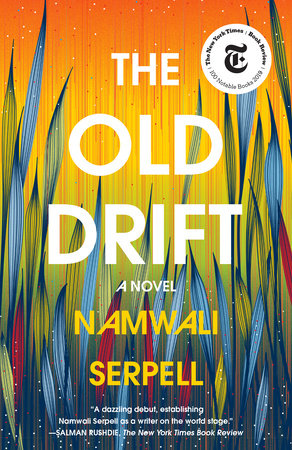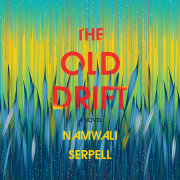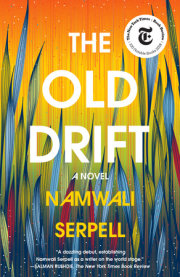Prologue
Zt. Zzt. ZZZzzzZZZzzzzZZZzzzzzzo’ona.
And so. A dead white man grows bearded and lost in the blinding heart of Africa. With his rooting and roving, his stops and starts, he becomes accidental father of this land, our pater muzungu. This is the story of a nation – not a kingdom or a people – so it begins, of course, with a white man.
Once upon a time, a goodly Scottish doctor caught a notion to locate the source of the Nile. He found instead a gash in the ground full of massed, tum- bling water. His bearers called it Mosi-o-Tunya, The Smoke That Thunders, but he gave it the name of his queen instead. In his journal, he described the Falls with a stately awe, comparing the far-flung water to British things: to fleece and snow and the sparks from burning steel, to myriads of small comets rushing on in one direction, each of which left behind its nucleus rays of foam. He speculated that angels had gazed upon it and said, ‘How lovely.’ He opined, like a set designer, that there really ought to be mountains in the backdrop.
Years passed. Adventure. Disaster. Fame. Commerce. Christianity. Civilisation. He was mauled by a lion that shook him in its jaws, he said, as a dog shakes a rat. His wife died of fever; his beloved dog drowned. He voyaged over land and through swamps and along endless waterways. He freed slaves along the way, broke their chains with his very hands and took them on as his bearers. Late in his life, he witnessed a massacre – slave traders shooting at men and women in a lake, so many the carcasses choked it and the canoes could not pass. He despaired. He was broken, broke; his queen had forgot him; the Royal Geographers had declared him dead. Then a mercenary Welsh bastard named Stanley found him, presumed, shook his hand, and sent word to London. And in an instant he was famous again, as if risen from the dead. Yet he refused to return to Merrie England.
Doddering, he drove deeper into the continent instead, still seeking his beloved Nile. Oh, father muzungu! The word means white man, but it describes not a skin colour but a tendency. A muzungu is one who will zunguluka – wander, aimless – until they zungusha, go in circles. And so our dizzy, movious muzungu pitched up here again, half-drowned in mud, dragging his black bearers with him.
His medicine box went missing – who took it? They never found out – and with it, his precious quinine. Fever hunted him and finally caught him. He died in a hut, in the night, kneeling on his bed, his head in his hands. His men disembowelled him, planted his heart under an mpundu tree, and bore his corpse to the coast. The HMS Vulture took his body home – what was left without the living was buried under stone at Westminster Abbey. His people recognized him by the scrapes of the lion’s teeth on his humerus bone.
There was great wonder at the resolve of his bearers. To travel with a corpse for months on end, suffering loss and injury, sickness and battle? To forge on in blistering heat and blundering rain, beating off the superstition that to carry death is to beckon it? To come all the way to England, to answer to interrogation, to build a model of the hut that he died in? What faith! What love! No, no – what fear! That corpse, that body was proof. Without it, who would have trusted them? Who would have taken their word that a white man, among savages, had died of bad luck – a mere fever?
Men never believe that chance can wreak such consequence. Yet the story of this place is full of such slips and skids. Error, n., from the Latin errare: to stray or to veer or to wander. For instance, the bazungu who later carved this territory into a colony, then a protectorate, then a federation, then a country came here only because Livingstone did. They drifted in and settled the land, drew their arbitrary lines in the sand, stole treaties from the chiefs using a devious ruse: a Royal Charter that wasn’t truly royal at all. Waving flags and guns and beads to trade with, they scrambled rabid for Africa, and claimed it was Dr Livingstone’s legacy.
But would you believe our godly Scotch doc was in fact searching for the source of the Nile in the wrong place? As it turns out, there are two Niles – one Blue, one White – which means two sources, and they are neither of them anywhere near here. This sort of thing happens with nations, and tales, and humans, and signs. You go hunting for a source, some ur-word or symbol and suddenly the path will split, cleaved by apostrophe or dash. The tongue forks, speaks in two ways, which in turn fork and fork into a chaos of capillarity. Where you sought an origin, you find a vast babble which is also a silence: a chasm of smoke, thundering. Oh, blind mouth!
The Falls
It sounds like a sentence: Victoria Falls. Or a prophecy. At any rate, that’s the joke I used to make until Her Royal Majesty Queen Victoria actually died in 1901, just before I landed on the continent. Two years later, I set eyes on that African wonder named for an English queen and became as beguiled as the next man. I came for the Falls, and I stayed for them, too. What they say is true – the spray can indeed be seen from thirty miles off, the roar heard from twenty. The last part of our trek from Wankie was hard going and it was eleven at night by the time we made camp about a mile from the Falls, under a gargantuan baobab tree. Tired as I was, I could not let the need of sleep come between me and my first sight of that vast tumble. I left the others and made my way alone to look over the Falls from above, from the so-called ‘Devil’s
Cataract’. I shall never forget it.
The night was luminous with moonlight. In the foreground was the bluff of Barouka island. Beyond it, veiled in spray, the main falls leapt roaring into the chasm four hundreds feet below. The spray was so powerful it was hard to say whither direction the Falls flowed. The shadowy black forest writhed its branches before them. The lunar rainbow, pale and shimmering, gave the whole scene a touch of faery. Awed beyond words, as if standing in the presence of a majestic Power quite ineffable, my hat came off. For an hour I stood bare-headed, lost in rapture.
No. I shall never forget that nocturnal view of the Victoria Falls, full in flood and drenched in moonlight. I spent thirty-two years within a mile of that spot, and I’ll be damned if that isn’t still the best lookout.
The next morning, I marked the occasion of my first encounter by carving my name and the date into the baobab tree: Percy M. Clark. 8 May 1903. This was unlike me but excusable under the circumstances. I set out for the drift five miles above the Falls, the port of entry into North-western Rhodesia. The Zambesi is at its deepest and narrowest here for hundreds of miles, so it’s the handiest spot for ‘drifting’ a body across. At first it was called Sekute’s Drift after a chief of the Leya. Then it was Clarke’s Drift, after the first white settler, whom I soon met. No one knows when it became The Old Drift.
For two hours I sat alone on the southern bank, popping off a rifle at intervals. At long last, I saw a speck – a dugout coming from the other side. It seemed so far up river, I wasn’t quite sure it was coming for me; the river was so swift that a long slant was needed to bring the boat precisely to the spot where I waited. A dugout is a ticklish thing to handle in a strong current – a single crossways cough is enough to tip it over – but the Barotse are excellent river-boys. Standing to their work, they use ten-foot paddles to steer their primitive craft. They brought me back across and then my goods.
The Old Drift was then a small settlement of a half-dozen men – there were only about a hundred white men in all of the territory of North-western Rhodesia at the time. I stopped at a mud and pole store that served as the local ‘hotel’. It belonged to a man who bore my surname, except his had the aristocratic ‘e’ attached. This would have been coincidence enough, but it turned out that he grew up in Chatteris in Cambridgeshire, practically next door to the university city I thought I’d long left behind. It seemed I couldn’t get away from the old country, or its airs.
Fred ‘Mopane’ Clarke – a native moniker, for he was ‘tall and straight and has a heart like a mopane tree’ – was the original white settler here. He came around 1898 and became a forwarding agent, then started a transport service across the Zambesi. He later went on to great fortune building hotels and selling them off. But when I met him, we were simply two men making the best of it. Mopane was amused that I had tossed a coin to choose my new vocation – photography was a relatively new field in those days. I didn’t bother to explain my ousting from the Trinity chemistry lab.
‘The bollocks on you!’ he said. ‘Did you journey to Rhodesia on such a whim, too?’
‘Yes,’ I lied. ‘Took up a post at a studio in Bulawayo. But toning and fixing is rather a chancy business in Africa, with the dust, not to mention the dust-devils. So I quit.’ Another lie.
‘But you’ve stayed on, it seems. Does life here in the bush suit you?’ ‘The settlers are a good sort. Honest, spirited. Don’t turn their nose up at people. The Kaffirs are bewildering, of course, but seem pliable enough. The insects are rather an abomination.’
We exchanged bug stories. Tam-Pam beetles tugging at the hair, rhino beetles blundering into the knob, the putrid stink beetle and whistling Christmas bug. Scorpions, spiders, centipedes. Beasties all. I won the debate by telling him about the day I arrived in Bulawayo two years earlier. The blinding sun plumb vanished behind a black cloud: not a dust storm but a plague of biblical locusts! Then came the clamour: the frantic beating of pots and trays to scare them off. A hellish din, but effective.
‘You shall face far worse here,’ said old Mopane cryptically. ‘Do you intend to pioneer?’
‘To wander. Pa always said, “My boy, never settle till you have to and never work for another man.” Time to play my own hand, do a touch of exploring. I believe I shall be the first to follow the Zambesi from the Falls all the way to the coast,’ I boasted.
‘Like the good Dr Livingstone.’
‘Oh. Yes, I suppose.’ I shook off my frown. ‘But without the religion.’
Mopane Clarke gripped my hand with a devilish grin.
. All rights reserved. No part of this excerpt may be reproduced or reprinted without permission in writing from the publisher.








